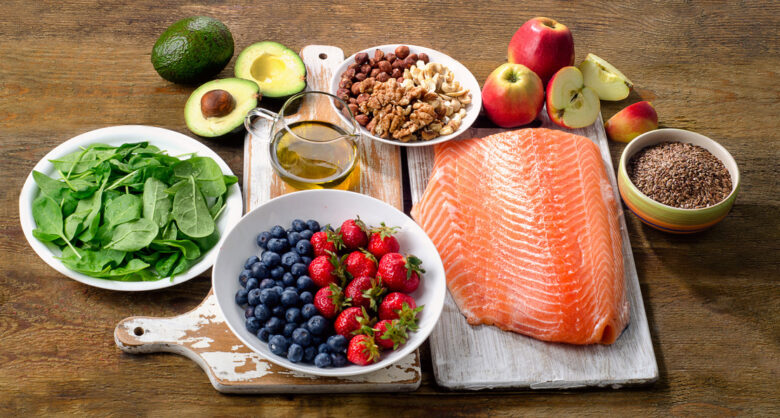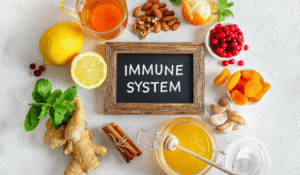In an era of increasing prevalence of chronic diseases like obesity, diabetes, and cardiovascular disease, a healthy diet is more important than ever. The food we eat directly influences how our bodies function, the strength of our immune systems, and our disease resistance. In addition to providing energy for our daily activities, a balanced, nutritious diet serves as a natural defense against disease. A healthy diet can significantly improve long-term health by strengthening immunity, reducing inflammation, and boosting metabolism. The goal of disease prevention is to develop mindful, lasting eating habits that promote both physical and mental well-being, rather than taking supplements or following fad diets. Let’s explore how a balanced diet can be your best defense against disease.
The Role of Nutrition in Disease Prevention:
Nutrition is essential for preventing disease and maintaining overall health. To function properly, the human body requires a range of nutrients, including protein, healthy fats, minerals, vitamins, and carbohydrates. Deficiencies in any of these nutrients can lead to weakened immunity, slower recovery, and an increased risk of chronic disease. Antioxidants in fruits and vegetables, for example, can reduce the risk of cancer and cardiovascular disease by scavenging free radicals that damage cells and promote inflammation.
Dietary fiber promotes digestion and lowers cholesterol, while omega-3 fatty acids in foods like fish and flaxseed contribute to heart and brain health. According to numerous studies from institutions like the Harvard School of Public Health, a diet rich in whole foods can prevent up to 80% of premature cardiovascular disease and stroke. Adequate nutrition strengthens the body’s natural defenses, allowing it to fight disease more effectively and recover more quickly.
Include Whole Foods for Better Health:
Including whole, unprocessed foods in your daily diet is one of the best dietary strategies for disease prevention. Nutrients often lacking in processed foods are abundant in whole foods, including fresh fruits, vegetables, whole grains, nuts, seeds, and legumes. The vitamins, minerals, dietary fiber, and antioxidants in these natural foods help balance hormone levels, reduce inflammation, and strengthen the immune system. Processed foods, therefore, often contain excessive amounts of sugar, harmful fats, and artificial additives, which can contribute to cardiovascular disease, insulin resistance, and obesity.
Replacing refined grains with whole grains like quinoa and brown rice, or replacing packaged snacks with fresh produce, can significantly improve your health. Furthermore, whole grains promote gut health, which is crucial for boosting immunity and balancing blood sugar levels. By making small, regular changes, such as cooking at home and avoiding sugary drinks, you can gradually transform your diet into a powerful disease fighter.
Balancing Macronutrients for Optimal Health:
A healthy diet isn’t just about what you eat; it’s also about how you balance it. Eating the right amounts of the three major macronutrients—fat, protein, and carbohydrates—is important for maintaining optimal health and preventing disease. Complex carbohydrates, such as those found in whole grains and vegetables, provide sustained energy without spiking blood sugar levels, reducing the risk of type 2 diabetes. Lean proteins, such as those found in fish, poultry, eggs, and lentils, strengthen the immune system and promote muscle growth and tissue regeneration.
Healthy heart and brain function depend on healthy fats, such as those found in avocados, almonds, and olive oil. Too often, people overeat or avoid carbohydrates, leading to an unbalanced diet. Finding the ideal combination of carbohydrates can help maintain hormonal balance, cardiovascular health, and a healthy weight. A balanced diet with the right macronutrients can prevent serious lifestyle-related diseases.
The Value of Antioxidants and Micronutrients:
Micronutrients, such as vitamins and minerals, are just as important for preventing disease as energy-producing macronutrients. Minerals like zinc, selenium, and magnesium, as well as vitamins A, C, and E, support immunity and protect cells from oxidative damage. Vitamin D, for example, contributes to healthy bones and immune protection, while vitamin C in citrus fruits improves white blood cell function. Antioxidants, found in colorful fruits and vegetables like carrots, spinach, and berries, fight free radicals that cause cell damage and aging.
Deficiencies in certain micronutrients can increase susceptibility to infections and chronic conditions like cancer, diabetes, and heart disease. Variety is essential for obtaining organic micronutrients; a rainbow diet ensures a diverse intake of important nutrients. The best way to strengthen your body against disease is to focus on consuming nutrient-rich, whole foods instead of supplements.
The Role of Hydration in Preventive Health:
Water is crucial for preventing disease, but it’s often overlooked in a balanced diet. Staying hydrated promotes kidney function, regulates body temperature, facilitates digestion, and helps eliminate toxins. Dehydration can lead to long-term health problems, such as slowed metabolism, overloaded vital organs, and impaired cognitive function. In addition to improving nutrient absorption and preventing kidney stones and urinary tract infections, drinking enough water daily can also contribute to maintaining healthy skin.
While health experts generally recommend eight glasses of water per day, each person’s needs vary depending on their environment and activity level. Eating water-rich foods, such as cantaloupe, cucumbers, and oranges, can further boost your hydration levels. Limiting alcohol, caffeine, and sugary drinks can also help prevent dehydration. Staying well-hydrated keeps all your body’s systems functioning properly, which improves your overall disease resistance.
Reduce Your Intake of Sugar and Processed Foods:
Reducing your intake of processed foods and sugar is one of the most direct and effective ways to prevent disease. Excessive sugar intake has been linked to cardiovascular disease, diabetes, obesity, and even certain types of cancer. Processed foods can cause oxidative stress and inflammation in the body because they are often high in harmful fats, hidden sugars, and preservatives. Studies have shown that consuming large amounts of processed foods can increase your risk of premature death by as much as 30%.
Replacing sugary snacks and soda with water, herbal tea, or fruit can significantly reduce these health risks. Similarly, choosing unprocessed, natural foods over processed foods ensures your body receives real nutrients, not just empty calories. Reducing your intake of processed foods not only improves your physical health but also increases your energy levels and mental clarity. A healthier diet allows your body to function more efficiently and fight disease.
Conclusion:
Maintaining a nutritious diet is an investment in your long-term health, not just a lifestyle choice. What we eat today impacts our future health and our ability to fight disease. Simple, effective dietary habits, such as eating whole foods, drinking plenty of water, eating a balanced diet, and avoiding processed foods, can significantly reduce the risk of chronic disease. A healthy diet is about providing the body with the resources it needs for optimal health, not about restricting growth and development. Understanding your diet and making wise food choices lays the foundation for long-term optimal health. Every nutritious meal brings you one step closer to a better, disease-free future. Prevention truly begins on your plate.
FAQs:
1. Which foods are most effective in preventing disease?
The healthiest foods to help prevent chronic disease are those rich in antioxidants, dietary fiber, and healthy fats, such as fruits, vegetables, whole grains, nuts, and lean proteins.
2. How does nutrition affect the immune system?
A nutrient-rich diet provides the body with important vitamins and minerals that help fight inflammation and infection, thus strengthening the immune system.
3. Does reducing sugar intake actually prevent disease?
Yes, absolutely. Reducing sugar intake can help prevent cardiovascular disease, diabetes, obesity, and inflammation—all major contributing factors to chronic disease.
4. How important is staying hydrated for maintaining excellent health?
Staying hydrated is crucial for digestion, toxin elimination, temperature regulation, and overall cellular function—all essential for preventing disease.
5. Is it better to receive nutrition from food or supplements?
Whole foods are the best source of nutrition because they contain a balanced mix of vitamins, minerals, and antioxidants that pills can’t match.




